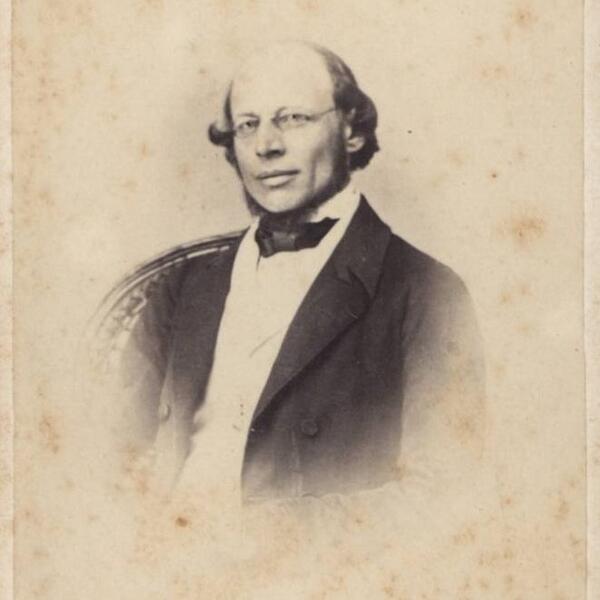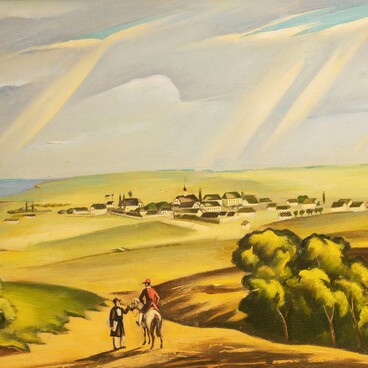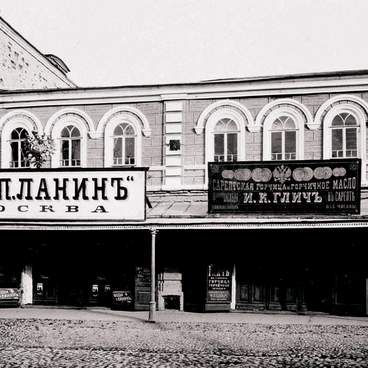Sarepta is a former German colony. Among the people who glorified the colony was Alexander Glitch, a famous Sarepta scholar-historian, archivist, pastor, and publisher. The exhibition features his photographic portrait of 1864.
Alexander Glitch was born in Sarepta in 1826 in the family of a mustard manufacturer. The Glitches founded the first Russian mustard-oil mill in the settlement, which produced high-quality mustard powder and edible mustard oil of long storage, highly valued in Russia and Europe. The family was the most powerful and wealthy in Sarepta.
Like many Sareptians, Alexander was educated at the school of the fraternal community for boys and additionally studied theology. Later, Glitch began to teach the Law of God at the Sarepta school.
In 1849, Alexander traveled across the Caucasus, was in Tiflis (until 1936, that was the name of Tbilisi). In 1857, Glitch became a preacher, pastor of the fraternal community in Sarepta.
Alexander Glitch collected and systematized the archive of Sarepta and is considered the first historian of the colony. He wrote the work ‘History of the fraternal community of Sarepta in southeastern Russia during its century of existence.’ In 1865, Glitch himself published this work in German at his own printing house in Sarepta. A year later, he republished this work in Germany. He was also the author of some other articles on the history of the Lower Volga region.
Alexander Glitch described and transferred in 1884 a part of the archaeological and ethnographic collections of his brother, the mustard manufacturer Konstantin Glitch, to the Historical and Ethnographic Museum of the town of Herrnhut. The transferred items - more than 90 pieces - were described in detail by the scientist in a report at a meeting of the Berlin Society for Anthropology, Ethnology and Ancient History. Konstantin Glitch was also fond of science - archeology, zoology - as well as collecting.
Alexander had a large family - he and his wife Sofia Luttringshauser had 13 children. With his retirement, Glitch left for Germany. He worked as an archivist and librarian of the Fraternal Union in the town of Herrnhut. He died there in 1907.
Alexander Glitch was born in Sarepta in 1826 in the family of a mustard manufacturer. The Glitches founded the first Russian mustard-oil mill in the settlement, which produced high-quality mustard powder and edible mustard oil of long storage, highly valued in Russia and Europe. The family was the most powerful and wealthy in Sarepta.
Like many Sareptians, Alexander was educated at the school of the fraternal community for boys and additionally studied theology. Later, Glitch began to teach the Law of God at the Sarepta school.
In 1849, Alexander traveled across the Caucasus, was in Tiflis (until 1936, that was the name of Tbilisi). In 1857, Glitch became a preacher, pastor of the fraternal community in Sarepta.
Alexander Glitch collected and systematized the archive of Sarepta and is considered the first historian of the colony. He wrote the work ‘History of the fraternal community of Sarepta in southeastern Russia during its century of existence.’ In 1865, Glitch himself published this work in German at his own printing house in Sarepta. A year later, he republished this work in Germany. He was also the author of some other articles on the history of the Lower Volga region.
Alexander Glitch described and transferred in 1884 a part of the archaeological and ethnographic collections of his brother, the mustard manufacturer Konstantin Glitch, to the Historical and Ethnographic Museum of the town of Herrnhut. The transferred items - more than 90 pieces - were described in detail by the scientist in a report at a meeting of the Berlin Society for Anthropology, Ethnology and Ancient History. Konstantin Glitch was also fond of science - archeology, zoology - as well as collecting.
Alexander had a large family - he and his wife Sofia Luttringshauser had 13 children. With his retirement, Glitch left for Germany. He worked as an archivist and librarian of the Fraternal Union in the town of Herrnhut. He died there in 1907.



